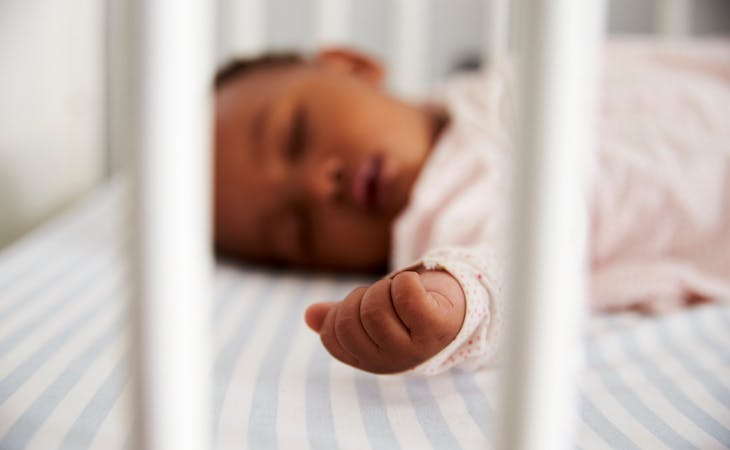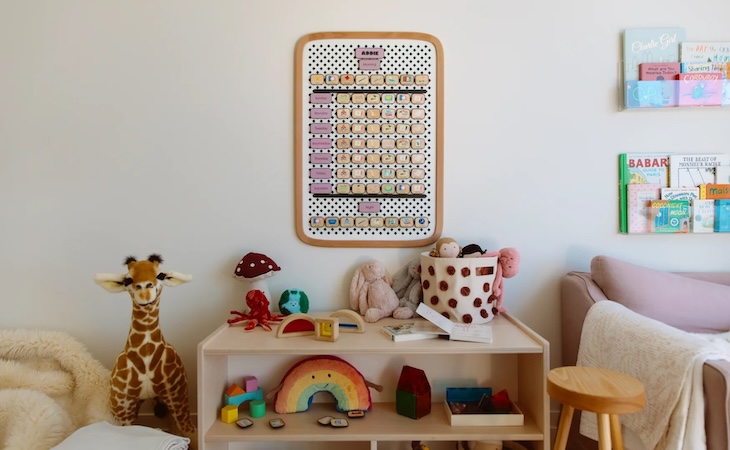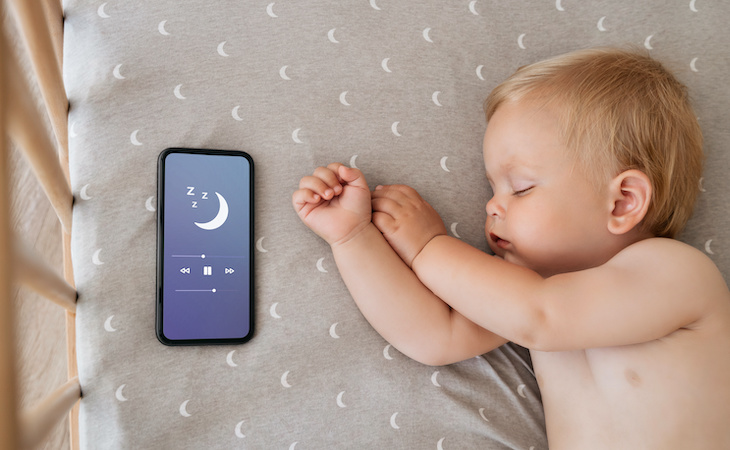If you’re a parent of young children, respiratory syncytial virus (RSV) is probably up there on your radar of things to be concerned about this winter.
Almost all children will get RSV at some point by the time they turn 2. [6, 10] It spreads easily, and you can blame daycare and other places where children gather. [10] But it can make it tough for the whole family to get a good night’s sleep when your baby is sick.
This article will explore what RSV is, how it affects a baby’s sleep, and what parents need to know to keep their babies safe during sleep.
What is RSV?
While RSV is a common respiratory virus that often shows up like a cold, it could potentially be serious in babies, especially for babies who:
- Are under 6 months old
- Were born premature
- Have certain health conditions
- Have weakened immune systems [3, 10, 12]
Common symptoms you should be on the lookout for include:
- Runny nose
- Sneezing
- Cough
- Wheezing
- Not eating/drinking well
- Fever [8]
In young babies, however, their only signs of RSV might be fussiness, not wanting to eat, and having low activity levels. [13] In most cases, these symptoms usually go away in one to two weeks without any treatment. [2] But if your baby seems like they’re struggling to breathe, seems dehydrated, or is getting worse, it’s time to call their provider. [4,13]
How should a baby with RSV sleep?
A sick baby’s symptoms might, unfortunately, get worse at night—especially their cough, warns Ashanti Woods, MD, a pediatrician at Mercy Medical Center in Baltimore.
“Many babies will have disturbed sleep, especially in the first few days of an RSV infection,” he explains. “The days that are often the most challenging are days three through five.”
You may notice your baby’s energy level is low, especially with a fever. They might sleep more than usual, but more often than not, sleep might be more interrupted. If your baby has several RSV symptoms at the same time, their sleep—and yours—might not be so great because their little bodies are fighting an infection, says Woods. [7]
When it comes to sleeping positions for your baby, there isn’t an ideal one, says Woods. As RSV continues to affect the youngest children, including many younger than 12 months,” he explains. “Babies under 1 year of age should always be placed on their back [for] safe sleep. [1]
No matter how old your baby is, if they’ve had their nose suctioned before bed, they’ll likely sleep better than if they were laid down congested. This can be achieved often by using a nasal aspirator and nasal saline solution, suggests Woods. [2, 9]
According to the Consumer Product Safety Commission (CSPS), if your baby is inclined “10 degrees or less, with flat and rigid surfaces” they’re likely to be safe while sleeping. [11] To put it in perspective, inclined sleepers such as the recalled Fisher-Price Rock ‘n Play, have an incline of 30 degrees. (Here’s how to help a sick child sleep better.)
How to help a baby with RSV sleep better
So how can you help your baby with RSV sleep better? Woods gives some tips for maximizing sleep during those tough nights of sickness:
- Make sure your baby is getting enough fluids during the day so they stay hydrated. This includes milk or formula, electrolyte solutions such as Pedialyte, and if they’re over 6 months, water. [5, 9]
- Before bedtime, suction out your child’s nose using nasal saline and a bulb syringe. [9]
- Run a cool mist humidifier with the bedroom door closed. [9]
- If their provider gives the OK, you can give acetaminophen or ibuprofen for temperatures of 100.4 degrees Fahrenheit or warmer. [2, 13] Don’t give your baby cough and cold medications if they’re under age 2. [9]
FAQs
Does RSV affect sleep?
Your baby might be dealing with a stuffy nose, fever, and cough. [4, 13] This can understandably keep your baby from getting good sleep at night and during their naps. In fact, as a parent, you might feel exhausted after a few nights of comforting your baby. The good news is that most babies improve in a week or two. [2]
Do babies sleep a lot with RSV?
It’s common for your baby to sleep more when they have an RSV infection, says Woods. They could be sleepier because their immune system is working hard to get rid of an infection. [7] But odds are, they might not sleep so well. This is especially true if they have multiple symptoms.
How does a baby sleep with RSV?
If your child is congested, it might seem tempting to let them sleep inclined. But the safest way for a baby to sleep is alone, flat on their back in their crib. [1, 11] Your best bet is to make sure your baby’s nose is suctioned out before they’re put down for the night so that they can breathe easier. [2, 9]
How do I keep my baby comfortable with RSV?
Keep your baby hydrated during the day with plenty of fluids. Use a little saline mist or drops in your baby’s nose and gently suction out any gunk before bed. You can use a cool mist humidifier in the bedroom. If your provider approves, try giving ibuprofen and acetaminophen for a fever. [2, 9, 13]
References
- About back sleeping | Safe to Sleep®. https://safetosleep.nichd.nih.gov/. https://safetosleep.nichd.nih.gov/reduce-risk/back-sleeping.
- American Lung Association. Diagnosing and treating RSV. https://www.lung.org/lung-health-diseases/lung-disease-lookup/rsv/treatment.
- American Lung Association. Learn about Respiratory Syncytial Virus (RSV). https://www.lung.org/lung-health-diseases/lung-disease-lookup/rsv/learn-about-rsv.
- American Lung Association. RSV symptoms, causes & risk factors. https://www.lung.org/lung-health-diseases/lung-disease-lookup/rsv/symptoms-diagnosis.
- Foods and drinks for 6 to 24 month olds. Centers for Disease Control and Prevention. https://www.cdc.gov/nutrition/InfantandToddlerNutrition/foods-and-drinks/index.html. Published July 10, 2023.
- Jain H, Schweitzer JW, Justice NA. Respiratory Syncytial Virus Infection. [Updated 2023 Jun 20]. In: StatPearls [Internet]. Treasure Island (FL): StatPearls Publishing; 2023 Jan-. Available from: https://www.ncbi.nlm.nih.gov/books/NBK459215/
- Lasselin J, Ingre M, Regenbogen C, et al. Sleep during naturally occurring respiratory infections: A pilot study. Brain Behav Immun. 2019;79:236-243. doi:10.1016/j.bbi.2019.02.006
- National Library of Medicine. Respiratory syncytial virus infections. RSV | MedlinePlus. https://medlineplus.gov/respiratorysyncytialvirusinfections.html.
- Office of the Commissioner. Should you give kids medicine for coughs and colds? US Food And Drug Administration. January 2023. https://www.fda.gov/consumers/consumer-updates/should-you-give-kids-medicine-coughs-and-colds.
- RSV transmission. Centers for Disease Control and Prevention. https://www.cdc.gov/rsv/about/transmission.html. Published April 26, 2023.
- Safe sleep – cribs and infant products. U.S. Consumer Product Safety Commission. https://www.cpsc.gov/SafeSleep. Published August 10, 2023.
- Shi T, Balsells E, Wastnedge E, et al. Risk factors for respiratory syncytial virus associated with acute lower respiratory infection in children under five years: Systematic review and meta-analysis. J Glob Health. 2015;5(2):020416. doi:10.7189/jogh.05.020416
- Symptoms and care for RSV. Centers for Disease Control and Prevention. https://www.cdc.gov/rsv/about/symptoms.html#:~:text=Almost%20all%20children%20will%20have,fluids%2C%20or%20experiencing%20worsening%20symptoms. Published July 14, 2023.




